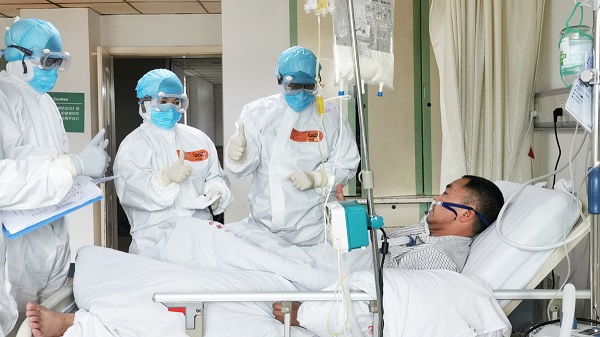Strict monitoring for virus patients on anti-malarial trial drug urged

Doctors encourage a patient to keep up his sprits at an isolation ward in Chongqing, Feb 2, 2020. [Photo/Xinhua]
Scientists urged all medical staff to strictly monitor patients who are taking the anti-malarial drug chloroquine phosphate as a trial drug to treat COVID-19 because the lethal dose of the drug was found to be around 2 to 4 grams for adults.
Expert said the notice is not to cause fear, but to remind other doctors to be more careful when administering the drug as China expects to roll out more clinical trials of the medicine in the future.
The Hubei provincial health commission issued a statement late Friday to all medical facilities in the province to rigorously monitor the side effects of the drug, which was listed in the latest treatment and diagnosis guideline as a trial drug that can be used in general treatment to inhibit the growth of the virus.
The Institute of Virology of the Chinese Academy of Sciences said that the lethal dose of the drug is around 2 to 4 grams for adults, and adverse effects could include sudden death, the statement said. The institute urged all hospitals that are administering this test drug to report cases of adverse effects to their local health commissions.
Chloroquine is being tested on over 100 patients in more than 10 hospitals in Beijing and Guangdong province, with a trial in Hunan province also in the pipeline, according to Zhang Xinmin, head of the China National Center for Biotechnology Development.
The Hubei local health commission told media on Saturday that there are no reported cases of death caused by overdose, adding the statement aims to let medical staff be more vigilant and careful when administering the drug.
Chloroquine phosphate, which goes by the market name Jinsai in China, is an established market drug that has been used to treat malaria for decades. It was one of the candidate drugs against the novel coronavirus in clinical trials in China, and early results had shown it had a therapeutic effect.
According to the safety manual, each tablet of the drug contains around 250 milligrams of the compound. For treating malaria, an adult would take four tablets, or a gram, of the medicine on the first day, and decrease to three tablets for the following days.
A Beijing pharmacologist who requested anonymity said infected patients overdosing on the drug is unlikely for trained medical professionals because "taking more than eight tablets a day, which is double the recommended amount, is extremely excessive."
The drug's safety manual said its lethal dose is around 50 mg/kg for adults. "In a typical clinical trial, an average adult is estimated to be 60 kg, so the published lethal dose is around 3 grams, which is within the range of what the institute had announced."
The expert said the drug has been thoroughly tested to be safe when used correctly, and "the purpose of the announcement is not to discredit the drug as a candidate to treat COVID-19, but rather a reminder for future doctors to pay attention to details when administering the drug since China is expanding its clinical trials."
Xu Nanping, the vice-minister of science and technology, said in a press briefing on Friday that 130 mild and moderately ill patients administered the drug saw their conditions stabilize and did not worsen into a more serious stage.
Another five severe cases were also given the drug, and four had recovered and left the hospital, while the last one's condition had improved to moderate level. "The nation will test and verify its clinical potency on a large scale," he said.
